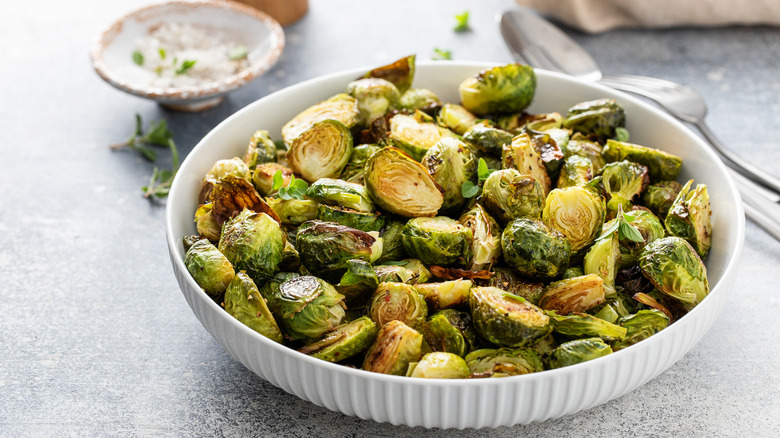
Eating Brussels Sprouts Every Day Has An Unexpected Effect On Your Cholesterol – Health Digest
Not many kids like Brussels sprouts, and adults aren’t huge fans either. A Heinz survey said Brussels sprouts were the most hated veggie in 2008 (via Slate), probably because 50% of people have a gene that makes them taste bitter (per BBC Science Focus). However, you might want to give Brussels sprouts another try, not just because farmers are engineering them to taste better (per Scientific American).
Brussels sprouts have the power to reduce your cholesterol, according to a 2022 review in Phytotherapy Research. “Brussels sprouts are packed with soluble fiber which blocks cholesterol absorption into the bloodstream, lowering both total and LDL (“bad”) cholesterol,” said Kara Lydon, RD, LDN, owner of Kara Lydon Nutrition and The Foodie Dietitian Blog. “Soluble fiber binds to cholesterol so when fiber is excreted, cholesterol goes with it.”
Your liver uses cholesterol to make bile acids to digest fats. When you eat fiber, it binds to these bile acids and eliminates them through your poop. That requires your body to use more cholesterol to make more bile acids, which results in lower cholesterol levels in your blood. A 2007 study in Food Chemistry tested the power of Brussels sprouts and other vegetables in the lab to see how well they bind to bile acids. Brussels sprouts, kale, and spinach were most effective in binding these bile acids compared to broccoli, mustard greens, cabbage, and green bell peppers.
Brussels sprouts benefits besides reducing cholesterol
If that’s not enough to convince you that you should be eating Brussels sprouts, they also have 3.3 grams of fiber per cup with just 38 calories. You’ll also get 83% of your daily amount of vitamin C and 130% of vitamin K. You might also be surprised that Brussels sprouts have 3 grams of protein. (Read the nutritional differences between cabbage and Brussels sprouts.)
Brussels sprouts also have phytochemicals that not only reduce cholesterol but also ward off chronic disease. They are considered cruciferous or Brassica vegetables, which are known for their antioxidant enzymes, carotenoids, and flavonoids that protect your health. According to a 2018 review in the Journal of Human Health, cruciferous vegetables have substances that help detox your body, reduce inflammation, and support your immune function. Diets rich in cruciferous vegetables protect you from neurological diseases, type 2 diabetes, and various cancers.
Healthy ways to cook Brussels sprouts
You can store Brussels sprouts at either room temperature or in the refrigerator, but you’ll reduce some of the key nutrients if you keep them for longer than seven days. It’s also best to store them whole because shredding Brussels sprouts can significantly reduce the glucosinolates that protect your heart and brain. How you cook Brussels sprouts can also affect some of its important nutrients. Boiling Brussels sprouts can cause them to lose some of their glucosinolates, so steaming or microwaving them might help retain, and sometimes improve, your body’s availability to absorb some of the nutrients. (Read why men should eat more Brussels sprouts.)
“My favorite way to serve Brussels sprouts is the simplest way — roasted in the oven with olive oil, salt, and pepper until they are browned and crispy,” Lydon said. “You could bump up the flavor by adding garlic and herbs like thyme, sage, or rosemary, or drizzle with a balsamic glaze.” Rather than eat them as a side dish, Lydon says you can also sprinkle them into salads and stir-fries.
Lydon also has some recipes of her own on her website, such as Crispy Thai-Inspired Brussels Sprouts and Shaved Brussels Sprout Salad with Pomegranate.





